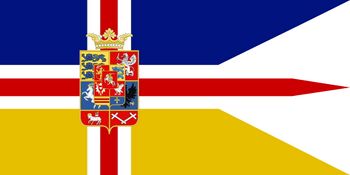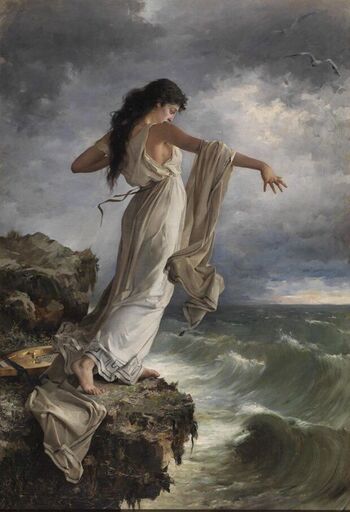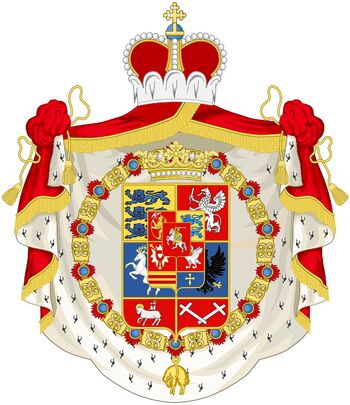National symbols of Eastarland: Difference between revisions
No edit summary |
No edit summary |
||
| Line 5: | Line 5: | ||
|- | |- | ||
|align="center"|{{wp|Royal flag}} | |align="center"|{{wp|Royal flag}} | ||
|[[File:Eastarland flag.jpg|350 px|frameless]] | |[[File:Eastarland Empire flag.jpg|350 px|frameless]] | ||
|align="center"|The Royal Flag of the Empire of Eastarland is the first symbol of statehood, enshrined in a state act dated November 3, 1804. Later, in May 1855, the exact description of the main symbol of statehood was confirmed in the Constitution (Grunnlov) of the Empire of Eastarland: | |align="center"|The Royal Flag of the Empire of Eastarland is the first symbol of statehood, enshrined in a state act dated November 3, 1804. Later, in May 1855, the exact description of the main symbol of statehood was confirmed in the Constitution (Grunnlov) of the Empire of Eastarland: | ||
<br>The flag of the Empire of Eastarland is a canvas with an aspect ratio of 2: | <br>The flag of the Empire of Eastarland is a canvas with an aspect ratio of 2:4, divided horizontally into two equal sides (the upper part is blue, the lower part is gold). From right to left is the red and white Eastarland cross. At the intersection of the vertical and horizontal stripes of the cross is the coat of arms of the Farenburg dynasty. | ||
|- | |- | ||
|align="center"|{{wp|Coat of arms}} | |align="center"|{{wp|Coat of arms}} | ||
|align="center"|[[File: | |align="center"|[[File:Eastarland Empire CoA.jpg|350 px|left|frameless]] | ||
|align="center"|The state royal coat of arms of the Empire of Eastarland is the second state symbol, from 1712 to 1804 it was the state symbol of the Principality of Nedebrad and the Farenburg-Meiss-Orin dynasty, which ruled there. At the Council of Ministers in April 1805, the coat of arms of the entire Empire was chosen. | |align="center"|The state royal coat of arms of the Empire of Eastarland is the second state symbol, from 1712 to 1804 it was the state symbol of the Principality of Nedebrad and the Farenburg-Meiss-Orin dynasty, which ruled there. At the Council of Ministers in April 1805, the coat of arms of the entire Empire was chosen. | ||
<br>It is a | <br>It is a shield, divided by vertical and horizontal lines into thirteen quarters. Each of the parts of the shield contains the coat of arms of the provinces of the Kingdom of Ōsellandet. The large shield is surrounded by the pendant of the princes of Nedebrad and is covered by the imperial mantle. | ||
|- | |- | ||
|align="center"|{{wp|National anthem}} | |align="center"|{{wp|National anthem}} | ||
Revision as of 15:07, 5 April 2021
| Name | Symbol | Description |
|---|---|---|
| Royal flag | 
|
The Royal Flag of the Empire of Eastarland is the first symbol of statehood, enshrined in a state act dated November 3, 1804. Later, in May 1855, the exact description of the main symbol of statehood was confirmed in the Constitution (Grunnlov) of the Empire of Eastarland:
|
| Coat of arms | The state royal coat of arms of the Empire of Eastarland is the second state symbol, from 1712 to 1804 it was the state symbol of the Principality of Nedebrad and the Farenburg-Meiss-Orin dynasty, which ruled there. At the Council of Ministers in April 1805, the coat of arms of the entire Empire was chosen.
| |
| National anthem | 
|
The national anthem is "Vyr oire er evig!" ("Our glory is eternal!"). The text was written in 1817 by the poet Ole Engen, the music was written by the composer Hanne Holmen in 1818. In 1821 it became the official anthem. |
| National personification | 
|
Trоndina or Trоndinia (Trondic: Trōndina; pronounced: [trεndi'n] - the national personification of the Empire of Eastarland, represented during the war of the Coalition against the Terany of the Castarillian Empire, as the personification of war, self-determination and freedom, and the image of the Goddess of Liberty and the Goddess of War. Trоndina is printed on banknotes, engraved on coins, depicted on postage stamps, and sometimes on government documents. Trоndina is one of the brightest symbols of Eastarland.
|
